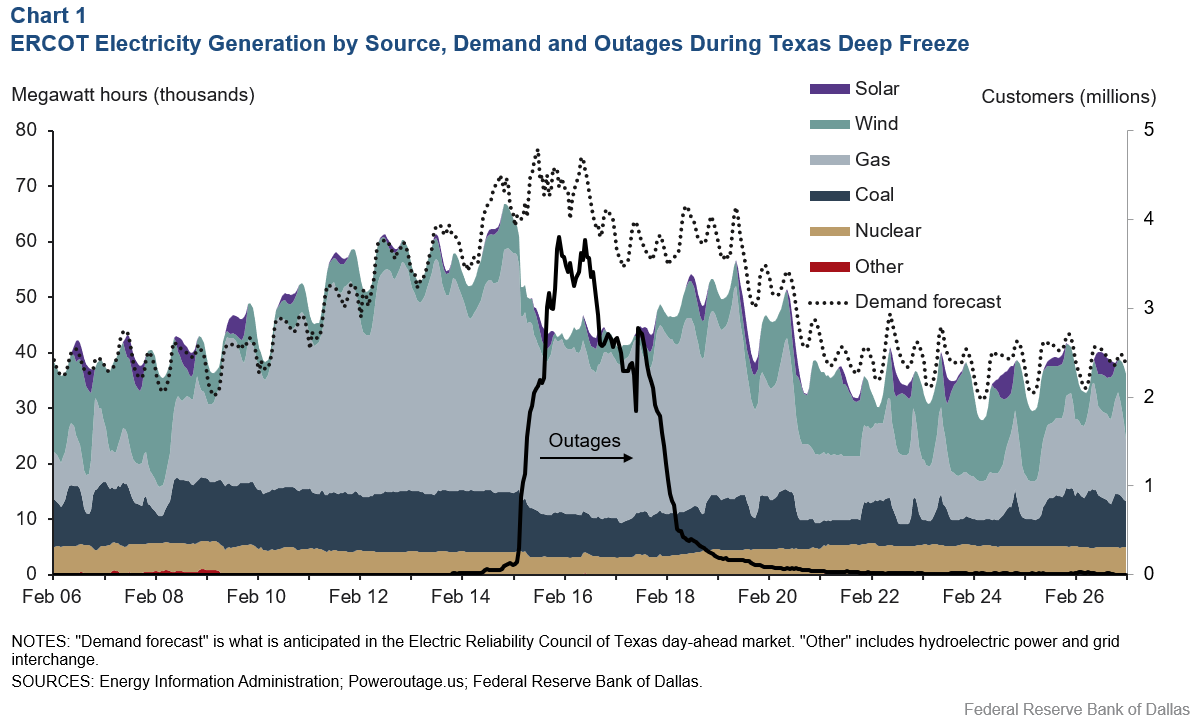The electric power system failure in Texas following severe winter weather continues to draw commentary (and may eventually draw politically actionable conclusions). The supply chain of electricity proved complex: e.g. some electric generation depended on natural gas supplies that themselves required electricity.
Here are some recent entries.
From the Federal Reserve Bank of Dallas:
Cost of Texas’ 2021 Deep Freeze Justifies Weatherization. by Garrett Golding, Anil Kumar and Karel Mertens
"Though the cost of annual preparations for extreme and relatively infrequent weather events has proven difficult for policymakers and industry to justify, the shocking aftermath of the February freeze and the resulting widespread power outage demand a careful re-examination. Our analysis indicates winterizing for extreme winter weather events appears financially reasonable.
...
"Temperatures dipped into the single digits and lower across much of Texas overnight on Feb. 14. Electricity demand surged as critical equipment failed at several power plants. Wind-farm output—already low due to diminished wind speeds—declined further as ice accumulated on turbine blades. Electricity generation declined yet again when gas-fired power plants were unable to procure needed gas supplies. Nearly 4 million Texas customers—representing more than 11 million people—lost power during the Arctic blast (Chart 1).

"While industry sources report gas production difficulties occurred because of wells and other such installations freezing, the bigger disruption began when power was cut to the wells, processing plants and compressor stations that move the gas into and along major pipelines serving power plants. During the storm, 38 of Texas’ 176 gas processing plants shut down due to weather conditions and electricity service disruption. Texas natural gas production dropped 45 percent Feb 13–17.
"This created a death spiral for electricity generation."
*************
Here's Peter Cramton in the Dallas News:
Natural gas producers hit the jackpot during the power outages, but they failed Texas The electrical grid is only as reliable as its fuel supply. by Peter Cramton
"starting on Feb. 11, the storm exposed every Texas county and much of the Midwest to frigid temperatures. Gas field equipment froze, and gas production began falling on Feb. 12, according to the Energy Information Administration, ultimately dropping 45%. Outages from gas-fueled power plants were double what planning models forecasted in the extreme-storm scenario. (Renewable resources, wind plus solar, performed better than expected during the storm.)
"With a deep drop in electricity supply and a sharp increase in demand, the system operator, the Electric Reliability Council of Texas, could not balance supply and demand without ordering controlled outages of about one-third of the system to prevent a catastrophic blackout. Those power cuts exacerbated gas delivery failures to many power plants.
"The failure of gas-fueled power was the proximate cause of the Texas electricity crisis. Had the gas supply been reliable, the electricity shortage would have been far less severe.
...
"Fixing the Texas gas market is no easy task. Its regulator, the Texas Railroad Commission, is a textbook example of regulatory capture. For decades, the commission has operated as an advocate for the oil and gas industry. This cozy relationship contributed to the Texas disaster because the lack of gas field and pipeline preparation for cold was a major cause of the electricity outages — and one that better regulation would have avoided.
*******
And here's the WSJ:
‘A Failure of Texas-Size Proportions’—State Debates How to Overhaul Its Power Market. February storm exposed flaws in laissez-faire electricity system; fixes promise to be complex and costly. by Katherine Blunt and Russell Gold
"Fixing the market promises to be as complex as it is costly. The challenge facing Texas Gov. Greg Abbott and state lawmakers is how to make the state’s deregulated power market more reliable, while limiting added costs that would make its electricity more expensive.
"Texas operates the nation’s only pure “energy only” electricity market, one in which producers are paid just for the power they sell, not the ability to deliver whenever watts are needed. All other deregulated electricity markets in the U.S. offer power generators some form of payment for being ready to produce power, to ensure the market has sufficient capacity to reliably provide an essential resource.
"For most of the past two decades, the Texas approach worked. It helped the Lone Star State keep wholesale power prices for much of the past two years at less than $30 per megawatt-hour on average, well below most other regional power markets.
"But a Texas grid that valued inexpensive power over reliability failed spectacularly during February’s winter storm and frigid temperatures, leading not only to crushingly high electricity prices, but power and water shortages that virtually shut down the state’s economy, and frozen pipes that caused widespread property damage."
 |
| Net capacity of generators, minute-by-minute |




